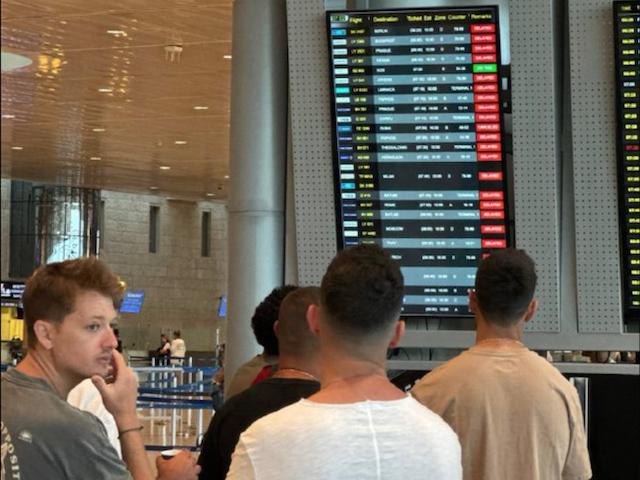In a significant development, the Israel Defense Forces (IDF) Home Front Command has announced the lifting of crowd restrictions that were earlier imposed on areas extending from Tel Aviv northward. This decision follows a meticulous reassessment of the current security situation by military authorities. However, the residents of communities along the volatile Lebanon border and in the Golan Heights remain under strict restrictions, underscoring the continued threat in these areas.
Ben Gurion Airport Resumes Operations Amid Regional Turmoil
Simultaneously, Israel's Civil Aviation Authority has resumed flights to and from Ben Gurion Airport, the nation’s primary international gateway. This comes after a temporary suspension prompted by escalating military operations. The airport, located near Tel Aviv, saw its operations disrupted earlier today as the IDF launched a series of powerful strikes against Hezbollah targets in Lebanon. According to Roy Steinmetz, a spokesperson for the airport, flights that had been diverted to alternative airports are now being cleared to depart from Ben Gurion once again, signaling a gradual return to normalcy.
Ben Gurion International Airport in Tel Aviv is filled with Travelers, with all Flights to and from the Airport having now been Canceled. pic.twitter.com/qpMrINxGa8
— OSINTdefender (@sentdefender) August 25, 2024
The Israeli Broadcasting Corporation confirmed that the airport's operations have resumed, albeit with some lingering disruptions. The brief suspension had forced some flights to be redirected, but the overall situation is stabilizing.
IDF's Preemptive Strike Foils Hezbollah’s Rocket Barrage
In a dramatic turn of events, Israel's Army Radio reported a major preemptive strike by the Israeli military in the early hours of Sunday. A massive air raid was conducted in Lebanon involving 100 warplanes, which targeted over 200 Hezbollah sites. This preemptive action reportedly thwarted a planned Hezbollah assault that was set to launch hundreds of rockets and missiles at critical infrastructure in central Israel. The IDF initiated its counterstrike at approximately 4:30 a.m., narrowly averting what could have been a devastating attack, as Hezbollah had intended to begin their barrage just half an hour later.
🚨🇮🇱AIRLINES CANCEL FLIGHTS TO ISRAEL
— Mario Nawfal (@MarioNawfal) August 25, 2024
Following the escalation between Hezbollah and Israel, Air France, Etihad Airways, and Aegean Airlines announced that flights to and from Tel Aviv on Sunday were canceled.
The airlines joined 16 others that have announced the… https://t.co/uG16cMgFlc pic.twitter.com/wmMH1R6FLi
Air Travel Disruptions and Resumptions
Despite the resumption of operations at Ben Gurion Airport, the aftermath of the morning’s events is still being felt. Some flights remain canceled or delayed, with airlines like Air France suspending their routes to Tel Aviv and Beirut until at least Monday. This disruption follows Hezbollah’s aggressive rocket and drone assault on Israeli targets, which prompted a swift and decisive response from the Israeli military.
As Israel’s primary airport slowly returns to its regular flight schedule, the broader impact of these hostilities is being felt across the region. Reports from the Saudi-owned Al Arabiya channel indicate that Beirut's airport has seen widespread cancellations, with several flights diverted to Amman, Jordan, reflecting the escalating tensions in Lebanon.
Hezbollah’s Escalation and Israel’s Response
Earlier today, Hezbollah claimed responsibility for launching 320 rockets at Israeli military positions, marking the beginning of what they describe as the "first phase" of their retaliation for the assassination of their commander, Fouad Shukr, by Israeli forces in late July. This ongoing exchange of fire has intensified since October 8, 2023, when Hezbollah began daily missile volleys across the Blue Line, the de facto border between Lebanon and Israel. The conflict, which has resulted in significant casualties, mostly on the Lebanese side, is part of a broader regional confrontation, with Hezbollah acting in support of Hamas.
Looks like Hezbollah intended to send 1000s of long range rockets at Tel Aviv, Ben Gurion Airport and other key Israeli targets at 5am
— David Collier (@mishtal) August 25, 2024
And it also looks like the Israeli pre-emptive strike took them all out at 4.45am
Pure class.
Notably, despite initial expectations that Hezbollah would coordinate its attacks with Hamas, the Iranian-backed group delayed its involvement, much to the surprise and frustration of Hamas leaders. This disconnect has led to open criticism within Hamas, as they grapple with the consequences of their solitary operation against Israel on October 7th.
The Broader Context: Gaza Conflict and Regional Tensions
The current escalation in Lebanon cannot be viewed in isolation. It is deeply intertwined with the ongoing war in Gaza, where Israel has been engaged in a relentless military campaign against Hamas since their deadly incursion on October 7, 2023. The offensive has devastated large parts of Gaza, with the Israeli military claiming to have killed around 20,000 militants. The destruction in Gaza, coupled with the fierce exchanges along Israel's northern border, illustrates the broader regional conflict at play, with multiple fronts of hostility opening up against the backdrop of a deeply entrenched and volatile geopolitical landscape.
As Israel continues to navigate these complex and dangerous waters, the situation remains fluid, with the potential for further escalations on multiple fronts. The lifting of restrictions in central Israel offers a temporary reprieve, but the nation remains on high alert, prepared for whatever comes next.


